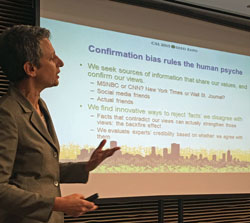 Washington Post columnist and Cape Cod oyster farmer Tamar Haspel (@tamarhaspel) provided some good food for thought at the ASTA CSS 2015 and Seed Expo Thursday with a session that focused on science communications and influencing public opinion. In a lively discussion with attendees, Haspel stressed the need for the agriculture industry to be more effective when communicating about science by doing more listening and understanding.
Washington Post columnist and Cape Cod oyster farmer Tamar Haspel (@tamarhaspel) provided some good food for thought at the ASTA CSS 2015 and Seed Expo Thursday with a session that focused on science communications and influencing public opinion. In a lively discussion with attendees, Haspel stressed the need for the agriculture industry to be more effective when communicating about science by doing more listening and understanding.
“Science is complicated, especially when it comes to agriculture,” Haspel said in an interview with Gale Cunningham, farm director at WYXY radio in Champaign, Illinois. “The way we make decisions about science isn’t always fact-based. Human beings tend to be led by our emotions, our values, our cultural affiliations – and all of those things get in the way of our seeing science clearly.”
“The first step is understanding that everybody believes that their position is science based,” Haspel says. “People who hold views that are essentially the equivalent of flat earth believe that the evidence supports their opinion and people who disagree with them are looking at the wrong evidence.”
She offered the following tips to communicate more effectively about science:
1. Be convinced
2. Reconsider the word “bias”
3. Drop “anti-science” from your vocabulary
4. Vet your sources. Manage your media
5. Acknowledge both risks and benefits
6. Find the smartest person who disagrees with you, and listen
7. Understand and appeal to values
8. Reach across the aisle
Listen to Gale’s interview with Tamar here: [wpaudio url=”http://traffic.libsyn.com/zimmcomm/asta-css15-tamar.mp3″ text=”WYXY interview with Tamar Haspel”]


